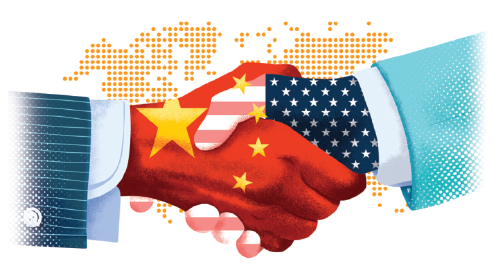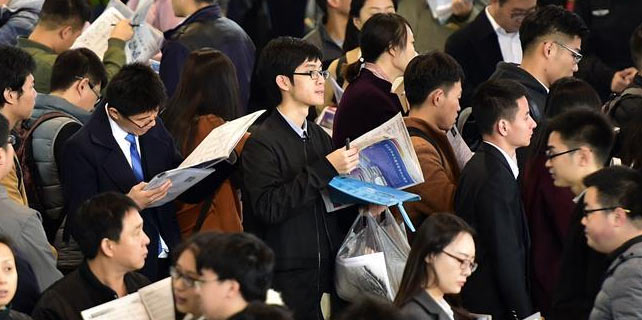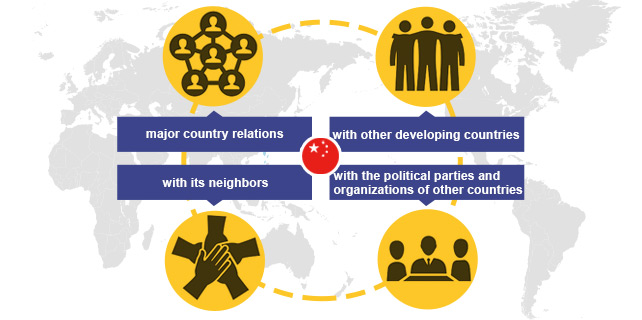Trump has warmed to China

On November 8, US President Donald Trump will meet Chinese President Xi Jinping in Beijing. This will be the third meeting between the two heads of state this year, following meetings at President Trump’s Mar-a-Lago resort in Florida in April and at the G20 Summit in Hamburg in July. President Trump’s visit will further enhance strategic understanding and friendship between the two countries and their heads of state, and hopefully move bilateral relations to a new level.
Given Trump’s tough stance on China during the presidential election and when he first entered the White House, it was widely believed that China-US relations would suffer a major setback after he took office. But more than six months into his presidency and China-US relations have actually progressed, something rare in the first year of a US presidency. Indeed, Trump has achieved many firsts during his presidency: he is the first US president to invite a Chinese head of state to visit within three months of taking office, marking the shortest breaking-in period for bilateral relations; he is the first US president to visit China within the first year of his presidency, as well as the first to meet a Chinese head of state three times in one year; he is the first US president who refused to meet the Dalai Lama in the first year after taking office, leading the Dalai Lama clique to complain that the Dalai Lama has been treated like a discarded dishcloth by the US.
Following the meeting at Mar-a-Lago in April, important breakthroughs have been made in China-US relations. The meeting established a personal friendship and positive working relationship between the two heads of state. Trump even announced that he got on very well with his Chinese counterpart. At their meeting, the two leaders announced that four high-level dialogue mechanisms would be established and a 100-day action plan would be formulated to strengthen bilateral economic relations. The first rounds of dialogue have finished, and the desired results have been achieved under the 100-day action plan, which has boosted relations.
These positive developments reflect two major transformations in Trump’s approach to China. The first is a shift in his understanding of China from a shallow subjective level to a deeper objective level. The second is a shift in his policy approach concerning China from emotional irrationality to constructive realism, which has seen Trump transform from being more hard line than his predecessor to being more friendly. This change has been driven by the following factors.
First, improving relations with China conforms to Trump’s “America First” policy. China’s rapid development over the past 40 years has seen it become the second most powerful nation in the world. America’s relationship with China is the external factor that most affects its development and security. In particular, the high level of interdependence between their two economies means that their interests are inseparable. According to the American Chamber of Commerce, China-US economic relations provide the US with about 2.6 million jobs and a market worth $560 billion. China’s huge foreign exchange reserves are mainly in dollars, and it holds more than $1 trillion in US treasury bonds, which are essential to maintaining the dollar’s status as an international base currency and balancing the US government’s budget. Trump’s policy of “America First”, therefore, won’t be successful without Chinese cooperation.
Second, China has handled Trump well. China has pursued a path of peaceful development, breaking from the mould of powerful countries vying for hegemony and seeking to avoid the Thucydides Trap that could lead to war. President Xi personally explained China’s policy of peace to President Trump, emphasizing that China’s rise does not pose a challenge to the US or any other country, but will only contribute to their prosperity and development. At the same time, China has maintained its strategic focus and remained calm when Trump was provocative towards it. Instead of being drawn into tit-for-tat exchanges, China gave rational and restrained responses.
Third, Trump needed a political victory. Trump’s emphasis on “America First” has led to a range of biased policies, worsening relations with a host of countries, including its traditional allies. This poor diplomatic effort drew domestic criticism, so Trump has attempted to compensate by making breakthroughs with China.
Fourth, Trump is a businessman and not part of the American political establishment. He does not share the same Cold War mentality and ideology that some American politicians do, and has less bias against the notion of China’s peaceful rise.
Trump has made a good start in his relations with China. Needless to say, however, it will not all be smooth sailing for him. The US’ trade investigation of China and its plan to conduct annual operations in the South China Sea will affect relations between the two nations. Moreover, Trump will not fundamentally deviate from the “engage and contain” strategy towards China. Nevertheless, the factors pushing Trump towards China will not disappear, so it is likely that relations between the two countries will be better than they were under his predecessor.
The author is an expert and former counselor for the Chinese Embassy in the United States.
The article was first published on chinausfucs.com on Nov 3.
















